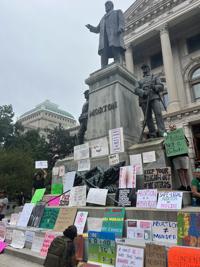
For the second time this year, an Indiana judge has issued a preliminary injunction on the state’s abortion ban—Senate Enrolled Act 1—stemming from an American Civil Liberties Union of Indiana lawsuit.
The first injunction came when a circuit judge in September decided there was enough merit to pause it, based on Planned Parenthood and the Indiana ACLU’s argument that the ban is illegal under the Indiana Constitution.
The lawsuit that prompted the newest decision was brought on behalf of Hoosier Jews for Choice and multiple women and argues that Indiana’s Religious Freedom and Restoration Act protects women’s ability to obtain an abortion if their religion instructs them to do so.
“[T]he Court finds that S.E.A. 1 substantially burdens the religious exercise of the Plaintiffs and that S.E.A. 1 is not the least restrictive means to achieve a compelling governmental interest,” wrote Marion County Superior Court Judge Heather Welch.
“This preliminary injunction acts as a second layer of protection, ensuring the rights of Hoosiers on the grounds of religious freedom,” Indiana ACLU legal director Ken Falk said in a press release. “This decision represents another crucial victory for abortion access, and we will continue to fight this ban until it is blocked for good.”
The repetition of the decision extended to Senate President Pro Tem Rodric Bray’s statement to The Statehouse File. He used almost the same wording as he had for the first injunction.
“We set out to pass a bill in the special session that would protect life and support mothers and babies, and that’s what we did,” said Bray, R-Martinsville. “It was always our intent to draft a bill that could withstand a court challenge, and I hope to see that will be the case.”
Two religions mentioned in the lawsuit are Judaism and Islam—both of which, it is argued, allow for abortions in cases not allowed by the ban.
The decision referenced a declaration from Indianapolis Rabbis Dennis and Sandy Sasso, saying, “An abortion is mandated [under Judaism] to stop a pregnancy that may cause serious consequences to the woman’s physical or mental health.
The judge continued: “The State argues that abortion at any gestational age beginning at fertilization ‘ends the life of an innocent human being’ … and that it has a compelling interest in protecting this class of ‘vulnerable human beings’ from being killed.”
This line of thinking was unpersuasive to Welch, however, who said, “The Supreme Court already recognized in [Burwell v. Hobby Lobby Stores, Inc.] that the question of when life begins is a religious one that the State may not answer legislatively or as a factual manner.”
Welch also noted the ban already has some exceptions, including for rape and incest, and said, “[T]he statute explicitly allows abortions in circumstances that the State acknowledges constitute the ‘killing’ of an ‘innocent human being.’”
“The State is willing in these instances to ‘forgo’ its interest where it deems the countervailing interest ‘compelling,’ but not where a religious mandate rests on the other side of the balance,” wrote Welch.
On Sept. 22, the first preliminary injunction on the abortion ban was issued. Three weeks later, the Indiana Supreme Court decided to hear the lawsuit instead of the Indiana Court of Appeals, setting the first day of arguments to begin Jan. 12.
As of now, it is unclear whether this second lawsuit will follow the same path. Indiana Attorney General Todd Rokita played a part in the first injunction’s process through the legal flowchart, requesting it be taken up by the Indiana Supreme Court, but did not respond to comment from The Statehouse File.
Jack Sells is a reporter at TheStatehouseFile.com, a news website powered by Franklin College journalism students.